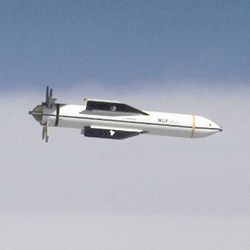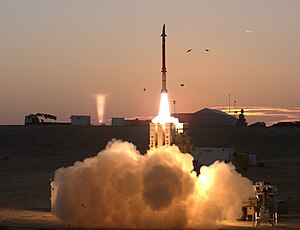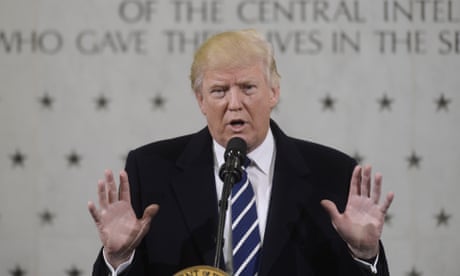EX-MOSSAD CHIEF: If Trump doesn’t give ‘Bunker-Busters’, Israel should develop them

Few people have walked the labyrinths of power for as long as Danny Yatom, the former Mossad director, IDF general and chief of staff, and military secretary to multiple prime ministers.
In fact, the title of the recently published English translation of his book is Labyrinth of Power.

GBU-57 Massive Ordnance Penetrator – Photo- DoD: Wikimedia Commons
The 71-year-old Yatom, who gained national attention at the side of Ehud Barak during the General Staff Reconnaissance Unit’s Sabena Flight 571 hostage rescue mission in 1972, recently sat down with The Jerusalem Post at his Dantov Global Consulting Group offices in Herzliya for a wide-ranging interview.
While Yatom could undoubtedly serve as a personal history book of key moments in Israeli history, he also has strong and nuanced views about the future and can become quite animated when taking a stand.
For example, while some on the Right in Israel have praised the coming of US President Donald Trump in practically messianic tones, Yatom said: “I hope he will be a good president toward Israel, and he gives a very good first impression about Israel, but as the saying goes, the proof is in the pudding.”
Will Trump merely suffice with promises and platitudes about moving the US Embassy from Tel Aviv to Jerusalem, or “will he give us new technologies like bunker-buster bombs,” so that Israel feels safer about future risk scenarios with Iran? asked Yatom.
Improved bunker-buster bombs, a weapon that the US possesses, could destroy Iranian underground nuclear facilities.
He also voiced concern about Trump’s talk of “isolation and not sending troops” anywhere, as Israel “needs the strongest power and democracy to get involved diplomatically and even militarily in various places in the world to bring order.”
“If the US is not there, then China or Russia, who are not as good for us,” could step into the vacuum, as has already happened with Russia in Syria, he said.
In addition, Yatom said he was “very worried about some of the statements by Trump that essentially were derisive of the CIA, FBI and military intelligence, as if he knows better than them.”
He expressed hope that “it will get better, because he will switch many” of the agency heads with his appointees, whom he trusts and with whom he has personal rapport.
At the same time that Yatom said that getting bunker-buster bombs would be a huge way for Trump to concretely help Israel, he said that if the US does not give them to Israel, “we should make our own,” due to the Iran nuclear deal’s sunset clause, in which restrictions on its uranium enrichment program expire eventually.
He expressed confidence that if Israel started working on the development of the weapons enough in advance of the deal’s expiration, “we have the science and technological ability to do it.” This should happen even if the IDF in the near term does not need to be practicing bombing raids on Iran, since Iran is mostly observing the deal to date.
In his book, Yatom gives one of the most detailed and masterful recounting of the seminal Camp David II talks in 2000 between then-prime minister Barak (under whom he served as chief of staff during the talks) and then-Palestinian Authority president Yasser Arafat.

Entry to the Dome of the Rock, on the Temple Mount – Photo: IsraelandStuff/PP
One question that he delved into in the book and also with the Post is whether things could have gone differently at Camp David – especially on the issue of the Temple Mount (he regards other final-status issues, certainly other than the Palestinian refugee issue, as much easier to resolve).
Regarding resolving the Israeli- Palestinian dispute over the Temple Mount, he said “Arafat was not ready at any point to give in on sole sovereignty for the Palestinians over the Temple Mount.”
He said Israel “gave many offers… joint sovereignty, split sovereignty with Palestinian sovereignty above the land and Israeli sovereignty below the land. This would mean that day-to-day sovereignty would be theirs, but they would not be allowed to dig under or damage the land, which was the site of the Holy of Holies” of the Jewish Temples.
Yatom added that “security and police issues would still be handled by us” and that “there would need to be an arrangement for Jews to pray on the Temple Mount – it is the holiest place for Jews – they need to let Jews pray.”
This last proposal is one thing that distinguishes Yatom from typical politicians who can invariably be counted on to sign on to a certain checklist of party-line views. In contrast, Yatom is ready to share sovereignty of the part of the country that Prime Minister Benjamin Netanyahu and the Likud would never budge on, but insists that Jews should come out of the deal with stronger prayer rights in that area than they currently enjoy under the same ruling Likud Party.
Currently, Jews cannot pray on the Temple Mount, and with no resistance from Netanyahu, the police have been on a campaign to ban Jews from the Temple Mount who appear to be starting to quietly pray or mouth prayers.
Overall, Yatom thinks Israel tried everything it could at Camp David II and blames the Palestinians, although he does note that Barak refused to have one-on-one meetings with Arafat, and that maybe that might have made a difference and changed Arafat’s mood.
“I’m also not sure if they would ever agree… but if we have a strong enough Israeli prime minister and head of the PA, maybe we can still get over it and find the right compromise language,” Yatom said.
In any event, he remains convinced that Israel “doesn’t have the luxury to throw up its hands and say there is no partner, there is no chance, so let’s go on like this until the end, because we will lose the Zionist and Jewish state” to the demographic problem.
In terms of a broader peace process strategy with the Palestinians, Yatom is in favor of regional negotiations along the lines of the Arab Peace Initiative, to push the Palestinians. But unlike Netanyahu, he would act on it now and would demand “parallel bilateral” talks with the Palestinians.
His hope would be that if Israel gets more benefits by opening relations “with 45-50 countries…it will be easier for Israel to give in on certain things.”
Why is the Mossad recruiting women?
In an interesting twist, Yatom’s interview with the Post marks the first comment by any current or former senior Israeli intelligence official on the Mossad’s unprecedented announcement in early January that it is specifically targeting a large number of female recruits.

Mossad recruitment ad aimed at women – Photo- Mossad.
Until a bit over 15 years ago, the Mossad did not even have any public recruiting or Web presence.
Yatom was the first head of the Mossad who was publicly named, and yet he still traveled the world in disguises, including using wigs. In at least one foreign country, the wig almost got him questioned, until the head of El Al security in that country jumped physically in front of him and said “it’s okay – he’s with us.”
Asked why the clandestine organization would come out so publicly focusing on recruiting women, particularly when there is already a long tradition of women in the Mossad, Yatom replied that “it doesn’t have enough.”
“There always were women. But there are things that women can do that men can’t do,” noting that he meant specifically in operational roles and not just administrative roles.
Pressed for an example, he said that “sending a two-man team through a street versus a man and a woman together – the man and the woman are inherently less suspicious… they look more innocent.”
Asked if the point was to use women to break in as spies in Iran or Arab states in seductive roles, he said that female spies actually might have “more problems in Iran or Islamic State-controlled areas because they are extreme and women have no position” in those societies. While he did not dismiss mild levels of seduction, he waved off using women as spies in the role of mistresses, saying “the Mossad doesn’t do this.”
Mossad vs CIA
Describing the clandestine relations between the Mossad and the CIA, the former spy chief remarked that the “CIA is a very serious organization and intelligence service… the Mossad’s relations with it multiply their joint power and reach… and there are lots of shared brainstorming of ideas and even similar methods between the Mossad and the CIA.”

‘Tools of the trade’ – IsraelandStuff/PP
While Yatom may have a lighter delivery than your typical ex-spy, probably partially due to spending so much time in politics, he still did stick to certain redlines, hinting that the Mossad had some abilities that the CIA does not, but going completely silent with a slight smirk about what they were.
Regarding the CIA’s unique abilities, which he knows well from working with former CIA director George Tenet and former CIA analyst Bruce Riedel, he did offer that “they see things globally” more than Israel.
On the other hand, he said the Mossad is “also interested in ISIS, [in] global al-Qaida, and what happens in Libya – such as when ISIS sends more fighters to Libya – should worry us” also, because Israel is in the same neighborhood.
The rescue op that wasn’t
One of the darker moments in Yatom’s storied career was the failed assassination of Hamas leader Khaled Mashaal in Jordan in September 1997.

The failed assassination led to the public capture of Mossad operatives and Israel’s need to release Hamas founder Sheikh Ahmed Yassin, among other things, to secure their release.
Eventually, after the failed assassination and another failed Mossad operation in Switzerland, Yatom, despite having been exonerated from responsibility for the Mashaal affair by a state commission, resigned from the spy agency.
Yatom’s book carefully upends the narratives of then-IDF chief of staff Moshe Ya’alon, Shin Bet (Israel Security Agency) director Ami Ayalon and defense minister Yitzhak Mordechai, who tried to blame him for the screwup.
One revelation that he shared with the Post, which has never been previously reported, is that the Mossad had a backup plan, including a set spot in Jordan for picking up its agents by helicopter and hoisting them off to safety.
Operationally, this took into account the close proximity of Jordan to Israel.
The Mossad had even given the IDF a general warning before the operation that something might be in the works, although it never got to the point of giving the IDF more specific details, as the rescue “would have had to have been done in the light of day,” and because it became irrelevant once some of the agents were arrested by Jordan.
It is unclear how history might have turned out differently in the Israel-Jordan-Hamas triangle involved in the Mashaal affair, had that helicopter rescue been given the green light.
Security Council resolution’s impact Returning to more recent history, Yatom discussed the December UN Security Council resolution condemning Israel’s settlements policy, the type of resolution the US refrained from vetoing for the first time in decades.
Though he is perceived as part of the Israeli Left ready for a significant settlement withdrawal, because of his work for Barak and time as a Labor MK, Yatom said “it was not a good decision. It was a failure for Israel diplomatically and also a mistake by the US.
“They didn’t need to do this,” he said. “They needed to continue what Obama did for eight years – to use their veto. This decision gives wind to those against peace and those who think we can’t speak to others. I would even say it was a big mistake.”
Explaining his rationale, he stated, “It, big-time, damaged Israeli security. Why? Because one of the four pillars [of security] with [deterring] the Arabs [from attacking] is the closeness and special relationship with the US.”
Telling war stories that few can tell, he noted: “I heard this from then-Syrian Army chief of staff Gen. Hikmat Shihabi, the No. 2 power in Syria under Hafez Assad for around 25 years, when I met him with Barak during the peace talks with Syria. He said to Barak in 1994, ‘Why do you need so many security arrangements [for peace]? You are stronger than Syria mostly because you have the US alliance. This is how the Arabs view it, and oy vavoy [woe to us] if we lose this.’”
Giving up the Golan
Hearkening back to those 1990s peace negotiations with Syria, which mostly centered around whether to give back the Golan, or part of the Golan, to Syria for peace, Yatom admitted that at this point Israel will very likely hold on to the Golan permanently or indefinitely.

Israel’s flag hoisted in the Golan Height, near the Syrian border – Photo: IsraelandStuff/PP
Earlier in the discussion, he said that part of what is important about his recounting so much detail about the Israeli-Palestinian peace negotiations in his book is to pave the way for future negotiations, which he expects some day.
Pressed about whether his detailed account of the Israeli-Syrian negotiations is still relevant, considering the current state of civil war in Syria, and even in the event of a divided country after a cease-fire, he admitted that the situation is totally different than with the Palestinians.
Still, the former top peace negotiator, who sat as the sole adviser sometimes in Barak’s meetings with president Bill Clinton and others during the Camp David II and Syrian negotiations, explained that there is still historical significance to studying the key moments of that period.
Coming back to the present, the Post asked Yatom what the Mossad does during times of relative peace, such as the current period.
(He would not comment on whether the Mossad was involved in the recent Tunis assassination, other than to say “no terrorist has immunity” and that operational terrorists like Muhammad Zawari can be the best targets, even if they are not famous.) With a twinkle in his eye, he replied: “The Mossad acts all the time; there is no time to rest and no vacation.”








